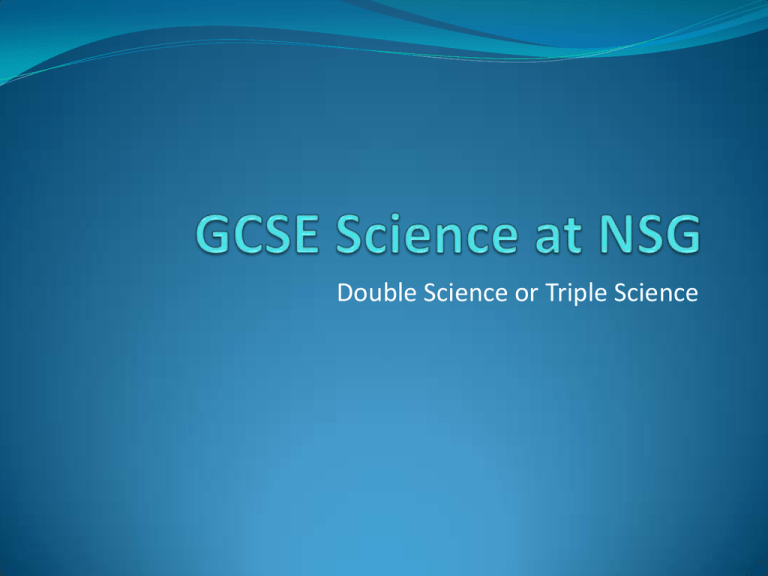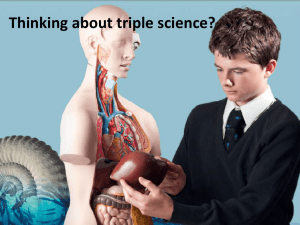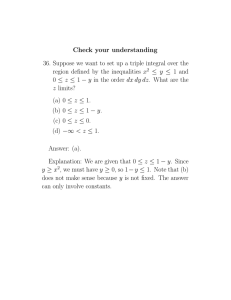Double Science or Triple Science
advertisement

Double Science or Triple Science GCSE Science at NSG OCR 21st Century Science Students will start the GCSE course in January of Y9 Two choices available: Double Science (leading to 2 GCSEs) Triple Science (leading to 3 GCSEs) Your daughter now needs to decide which option she would prefer to take Your choice today Double science Two GCSEs Core Science in Years 9 and 10 Additional Science or Additional Applied Science in Y11 Triple Science (also known as Separate Sciences) Three GCSEs Biology, Chemistry and Physics Course is taken throughout Years 9 to 11 Core Science: Year 9 & 10 75% Exams taken in May/June 2014 B1, C1, P1 B2, C2, P2 B3, C3, P3 25% Coursework Data Analysis Case Study At the end of Y10 your daughter will be awarded a GCSE in Core Science 3 double lessons per week with one or two teachers 2 Hours Homework per week Additional Science: Year 11 75% Exams taken in May/June 2015 B4, C4, P4 B5, C5, P5 B6, C6, P6 25% Coursework Practical Investigation At the end of Y11 your daughter will be awarded a GCSE in Additional Science 3 double lessons per week with one or two teachers 2 Hours Homework per week Additional Applied Science: Year 11 40% Exams taken in May/June 2015 Science in Society Science of Materials and Production 60% Coursework At the end of Y11 your daughter will be awarded a GCSE in Additional Applied Science 3 double lessons per week with one or two teachers 2 Hours Homework per week Triple Science Science is taught as separate subjects Students will therefore gain a separate GCSE for Biology, Chemistry and Physics (3 in total) Your daughter will be taught by three different teachers who specialise in that particular subject This is the more demanding option due to the increased amount of coursework and scientific content to learn Triple Science The course starts in Y9 and is examined in summer of Y11 75% Exams 3 exams per subject 25% Coursework Practical Investigation One double lesson per week per subject One homework per week per subject Triple Science Exams (June 2015) Biology Exam 1: B1, B2, B3 (25%) Exam 2: B4, B5, B6 (25%) Exam 3: B7 (25%) Chemistry Exam 1: C1, C2, C3 (25%) Exam 2: C4, C5, C6 (25%) Exam 3: C7 (25%) Physics Exam 1: P1, P2, P3 (25%) Exam 2: P4, P5, P6 (25%) Exam 3: P7 (25%) The 7th Module is unique to the separate science courses It is much larger with about 3x the content of the other modules How are the groups chosen? Students in Miss Adams’ group in Elm (9AS1) and Mrs Fowkes’ group in Oak (9BS1) will do triple science Unless students state that they prefer to do double science Remaining classes: Student preference by letter Teacher recommendation Exam performance in Y9 Autumn term In order to do Triple Science students need to achieve a Level 6 in each end of unit test Only limited places in Triple Science (60 per Oak/Elm – including those in 9AS1/9BS1) What do I need to do now? Have a discussion with your daughter Things to think about Does she intend to study science at A-level? Is she prepared for the extra workload of triple science? Is she prepared to revise for 9 exams in Summer 2015?!? Letters will be sent to all students shortly which will need to be returned to her science teacher Any Questions?

